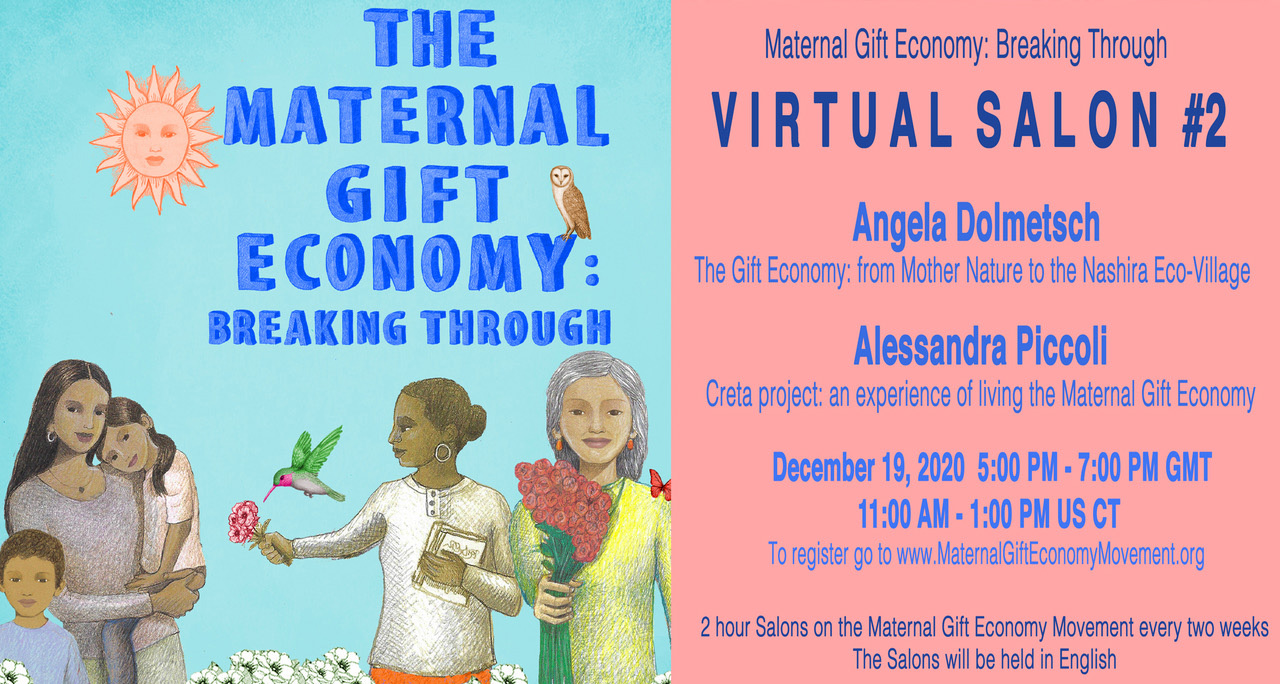
Salon #02 - December 19, 2020
Angela Dolmetsch and Alessandra Piccoli with Giovanna Berber

Dr. Angela Dolmetsch
Presentation title: The Gift Economy from Mother Nature to the Nashira Eco-Village
Two thousand years ago there lived a community in what is today El Bolo San Isidro in Palmira, Colombia. This was a matriarchal community that worshipped Mother Earth and their goddesses were women breast feeding and giving birth as can be seen from the clay and gold figures found recently in newly uncovered graves. These figures of women as mothers, shown giving birth and breastfeeding, symbolized gifts received from Mother Nature, and were objects of worship, together with the sun and the moon. The air we breathe, the water we drink, the plants and other food that Mother Nature offers us are all gifts from her and are priceless. European Colonialism, accompanied by religious catechization, expelled violently this relationship with Mother Earth as Vandana Shiva rightly put it. Colonialism established a price for captured men as slaves and for the bodies of women as sex objects for the use of patriarchal invaders. They devalued motherhood, and established patriarchal paradigms that still dominate and subvert the indigenous communities that strive to preserve their ancestral traditions.
The Nashira eco-village, where mothers rule is a modern effort to revive ancestral indigenous customs, based on the tradition of a matriarchal gift economy. Giving back control of the land so as to allow mother nature to give her gifts, by respecting the environment, growing fruits and vegetables and in contrast to an often exploitative exchange economy, neighbours give and receive gifts according to their needs and those of their children. In its 18 years of existence, the Nashira eco-village has changed paradigms. Women are respected and unwanted adolescent pregnancies are no longer the norm. Mothers do not need to essentially sell or cede their daughters to richer neighbours for money, and violence against women has been largely eliminated. The sharing of resources through a practical application of the gift economy has helped to make extreme poverty a thing of the past at a time when the Covid 19 pandemic has exposed the frailties of today’s social structures.
Angela Dolmetsch was born in Cali Colombia, she has a Law degree from La Universidad San Buenaventura and a Ph.D. from London University. Her thesis was on Maternalism in Colombian Politics. She met Genevieve Vaughan in 2001 at the Wise Women’s Workshops in Loten Norway and since then she has tried to put into practice the Maternal Gift Economy. The Eco-village Nashira, is a practical example of the Gift Economy where 80 mothers victims of the Colombian conflict received land to build with government subsidies 80 houses at no cost becoming the seeds for a community of peace. She is the director of a weekly TV program el Agora, and writes a column in the Cali news paper “El Pais. She has published several books. “La otra Cara del Dólar” (1985), “Of Governments and Guerrillas” (1988) “El Hombrecillo que se tragó a Dios y otros relatos (1999). She also has articles in several publications. The following books are forthcoming: “las Madres en la Politica Colombiana ” “Nashira un Canto de Amor“.

Alessandra Piccoli
ecco quanto chiedi:
Creta project has been an experience of living maternal gift economy and construction of an elective matri-clan rferring to Studies on Contemporary Matriarchies of Heide Goetner Abendroth and to Genevieve Vaughan´s Gift Economy. A circle of women and men has worked together to establish an egalitarian society in our here and now.
Alessandra Piccoli has a master degree in archaeology and a second one in management of social and solidarity economy, PhD candidate in social pedagogy plus a ten years and more experience in project management. "I am an activist, eco-feminist and transformative scholar. My research interest are: social and solidarity economy, food sovereignty, ecofeminism, eco-social transformation. I live in Trentino - Italy and I am mother of two."
